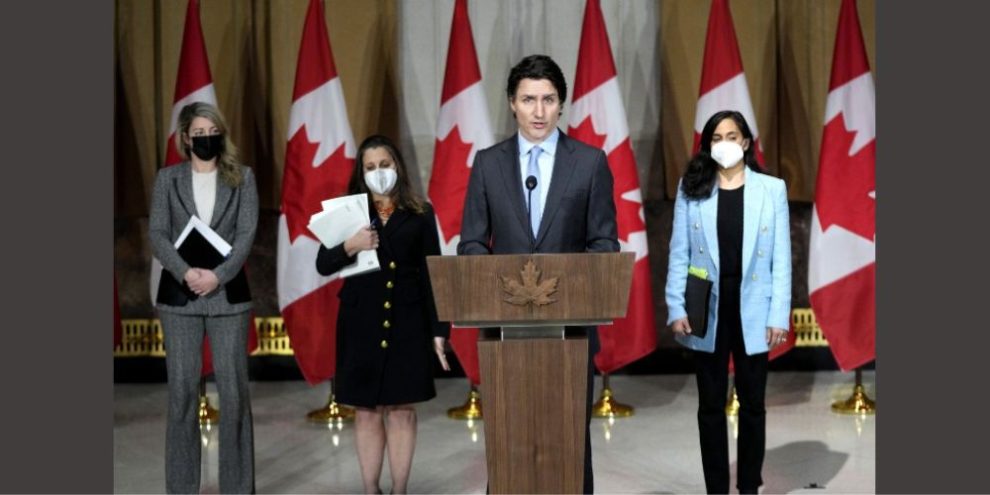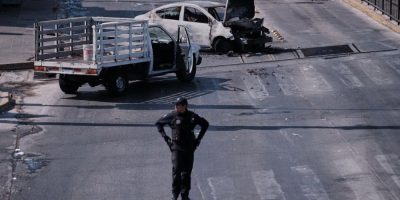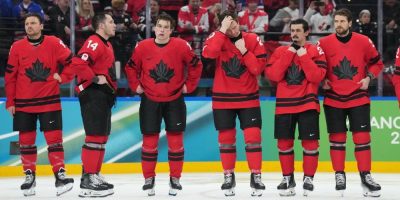
By Laura Osman in Lviv
Nearly one year ago, Prime Minister Justin Trudeau walked up to a podium in Ottawa, flanked by three of his top ministers, and declared the world had changed overnight.
"This morning, Ukrainians woke up to the brutal, terrifying reality of war," Trudeau said on Feb. 24, 2022, after missiles and airstrikes rained down on the country in the early morning as Russian tanks rolled toward the capital of Kyiv.
"Russian violence, aggression and violation of international law will not go unpunished," he said, the vast room heavy with silence.
Since then, the invasion has destabilized families, economies and the world order. Nearly a year later, minds are turning toward rebuilding what has been lost and finally claiming a sense of justice.
"The horrors of the genocide and the war crimes that have happened, it's not forgivable," said Ihor Michalchyshyn, the executive director of the Ukrainian Canadian Congress, in an interview in Ottawa.
No one knows exactly how the war will end, or when, but Michalchyshyn said Russia must be held accountable.
"I think that would be a nightmare scenario, where the war ends, justice fails. But I don't think it will," he said.
Foreign Affairs Minister Mélanie Joly made a show of solidarity last week with a two-day visit to Ukraine ahead of the anniversary to talk about what that accountability will look like.
She spoke to Ukraine President Volodymyr Zelenskyy about "addressing the issue of crimes against humanity, war crimes, the crime of aggression, and also sexual violence related crimes," Joly said at a virtual press conference from Krakow, Poland on Thursday.
Ukraine's general prosecutor Andriy Kostin told Joly the country has already identified 60,000 crimes linked to the war.
The International Court of Justice and the International Criminal Court have already been tasked with investigating and prosecuting war crimes and crimes against humanity purported by Russian forces, but the crime of aggression falls outside of their respective mandates.
"We've joined the core group of countries that believe that there should be a special tribunal on the crime of aggression," Joly said.
The United Kingdom is also part of that group of countries.
In the meantime, Ukrainians within and outside the country continue to live with the consequences of the war.
"Ever since it started, it seems to be like a nightmare," said Halyna Dmytryshyn, sitting at the kitchen table in the small apartment she shares with her son and stepson in Ottawa.
For months after the invasion she stayed in her home community, just outside of Ivano-Frankivsk in western Ukraine. Finally, she decided conditions were getting worse for her child and she left.
"I want the war to be finished as soon as possible, but I know it's just impossible … and the worst thing is that everybody is getting used to it, and the world as well."
Even in Lviv, a relatively safe region in the west of Ukraine near the Polish border, air-raid sirens sound several times a day as a reminder of the constant danger faced by civilians. Many people pay the warnings no mind, no longer willing to run for cover in basements every time they go off.
Since the initial invasion, Ukraine pushed the Russian military out of the capital and forced the invaders to abandon territory in the northeast. The Ukrainians also regained some captured communities in the southeast of the country.
Still, the war took a heavy toll on the people of the country this winter as fierce fighting continued along the Russian border and Russia appeared to focus airstrikes on energy infrastructure, leaving Ukrainians without power or heat in the dead of winter.
Western allies, initially apprehensive about escalating the conflict by offering Ukraine weapons that could incite Russian President Vladimir Putin, have sent increasingly advanced and lethal weaponry to aid Ukraine in its defence.
In a recent bid to head off a spring offensive, Canada joined other allied countries in donating modern battle tanks to Ukraine's arsenal.
"The boundaries on what counts as a weapon that can be provided to Ukraine has steadily changed," said Roland Paris, international affairs professor at the University of Ottawa and Trudeau's former senior foreign policy adviser.
In the last year, Canada has dedicated more than $5 billion to supporting Ukraine, including more than over $1.2 billion in military assistance.
While no one can be sure how the conflict will end, Paris said the most convincing assessments suggest it will continue for a long time.
He said it could become a "frozen conflict, where you have ongoing hostilities at varying different levels of intensity with maybe periods of lulls and even ceasefires."
That's a possibility that weighs on Michalchyshyn's mind, but he said his fear about that scenario is muted by talk of international justice, criminal tribunals, and accountability.
"That's what kind of gets us through," he said.
No matter what comes of those trials, Dmytryshyn said in some ways, the nightmare Ukrainians have shared will never truly be over.
"I always pray for the finishing of war, but it's not an issue because it will never leave us," she said.
"We've changed. We changed a lot and nobody will be the same."
This report by The Canadian Press was first published Feb. 19, 2023.
Banner image via The Canadian Press






